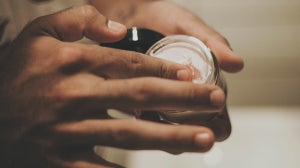
If you have oily skin, you'll already know the downsides: shiny patches, spots and large, conspicuous pores. You have over-active, oil-producing sebaceous glands to thank for these problems, along with male hormones which send them into overdrive. And if you suffer from oily skin, you're not alone - it's the most common skin type of all, especially in men whose skin is oilier to begin with.
Oily Skin: The Bad News
Under normal circumstances, your sebaceous glands play an essential role in lubricating your skin, protecting it from environmental damage by producing a lubricating oil called sebum. But an excess of a hormone called dihydrotestosterone (DHT) can cause them to produce an excessive amount of this natural oil. The result? Oily skin - and with it an increased susceptibility to spots, a problem that many men find worse during the summer when soaring temperatures stimulate sebaceous gland activity.
Oily Skin: The Good News!
It's not all bad news though. For one thing, oily skin tends to be less prone to premature ageing because the oil protects it and keeps it supple. What's more, the problems caused by oily skin tend to recede as we enter our mid-thirties when our skin's activity begins to slow.
Until then, though, you'll need a skincare routine that helps keep excess oil in check and reduces the blocked pores that lead to spots. You'll also need to keep products that are designed for oily skin in mind, like oil-free moisturisers and products that contain ingredients to soak up excess oil and leave skin shine-free. Crucial to dealing with the problem of oily skin is to ensure that the excess grease is removed without stripping away the important natural lipids that protect the skin against environmental assault and damage.
Oily skin might be a pain, and even those with dry skin can be susceptible to the occasional oily outbreak, but there's plenty you can do to keep the grease under control. For starters, consult Mankind to build a tailored skincare regime - one that not only treats oily skin, but also helps to prevent its re-occurrence.
How To Get Rid Of Oily Skin:









